The finance industry has begun a transformation process and most of the changes are due to the increased application of artificial intelligence in the finance sector. Thus, by including artificial intelligence in their work, financial professionals can improve investment approaches and get through intricate financial processes faster and more accurately. Starting from predictive analytics, machine learning, and natural language processing AI is gradually entering every corner of the finance industry.
In this blog, we break down the list of 12 AI Tools for Finance that have changed the game since 2024 These tools encompass everything from artificial intelligence-integrated market prediction platforms to smart underwriting solutions, enabling financial experts to enhance their performance, manage potential challenges and liabilities, and keep up with rivals.
Why AI Tools Are Essential for the Finance Sector
Machine learning techniques are getting accepted and implemented in financial organizations where detail-oriented work is performed by financial institutions, advisors, traders, and analysts. The impact of AI in finance is vast and can help businesses:
- Automate manual processes: Daily administrative procedures such as risk evaluation, report writing, and customer relations have become digitized, thereby minimizing the margin of error and operational cost.
- Improve risk management: Today, AI solutions can forecast markets, identify frauds, and estimate credit risks, and that can reduce potential threats to business financials before they occur.
- Enhance decision-making: Using artificial intelligence technologies financial experts get a great idea of investments, customers, and markets.
- Personalized customer interactions: AI is demanding more customized solutions for product sales and financial advice, solutions anchored in the numerous technological advances in Customer Service.
These tools are likely to be more integrated into the initial process of finance and will be more valuable for the finance industry. So, let’s start exploring the Top 12 AI Tools for Finance to know how things are changing for financial specialists.
Top 12 AI Tools for Finance in 2024
1. Kavout

Kavout is an advanced name developed for financial markets that gives smart options for stock selection using a machine-learning approach. It provides interactive chart analysis and other data associated with large quantities of historical data, market outlook, and macroeconomic indicators for stock performance predictions.
Moreover, Kavout’s AI models only enhance as we create new models to improve the accuracy of stock recommendations, to become an effective tool for traders and investors who seek easy, convenient, and effective means to arrive at rational judgments. It also works in harmony with portfolio management solutions with the intent of delivering individualized investment recommendations relying on the AI system.
Key Features:
- Stock recommendation based on artificial intelligence
- Predictive market insights
- Real-time sentiment analysis
- Portfolio optimization tools
Positives:
- Individuals should be in a position to forecast the stock market avails.
- Accompanied by effective investment decision-making by a backup of data
- Personalized stock picks
Negatives:
- Focus is limited to stocks
- Paying on a subscription basis could be costly for investors who only engage occasionally.
Pricing: Pricing is subscription-based, starting at $199 per month for basic access.
Best For: Individual investors, traders, and hedge funds seeking AI-driven stock market analysis.
Ratings: 4.5/5
Website: www.kavout.com
2. Upstox

Upstox is a trading platform that applies artificial intelligence to assist traders in making the right choices on a given stock by offering live information. The technologies used by Upstox include artificial intelligence and machine learning, providing the client with auto trading, charts, strategies and analytics. The core of the infrastructure is an easy-to-understand site and at the same time highly effective calculations perfect for improving the portfolio’s position and managing the risks and trading process. It also permits algorithmic trading, letting the users test the strategies and manage their operations powerfully.
Key Features:
- Real-time market insights
- Industry-ready algorithmic trading utilities with artificial intelligence incorporation
- Advanced chart analysis
- Low-cost trading platform
Positives:
- Low cost to institutions as well as for the end user and traders
- Point-and-click design for novices
- Market updates and what to do in the markets right now
Negatives:
- The strategic direction is mainly targeting the Indian markets
- The trading speed can decline the large trading volumes occur
Pricing: Offers a free basic account with premium plans starting at ₹20 per order.
Best For: Retail investors and traders looking for AI-assisted trading on a budget.
Ratings: 4.3/5
Website: www.upstox.com
3. Zest AI

Zest AI specializes in employing artificial intelligence and more specifically machine learning to evaluate credit risk for lenders, credit agencies, and general financial institutions. Smart underwriting is also offered to help enhance decision-making in the loan origination sector. Employing Zest AI’s platform a large number of variables are used to match credit-worthy customers as well as minimize default risks.
Key Features:
- Credit risk prediction with the help of artificial intelligence
- Enhanced underwriting tools
- Fast and instant decision on the loan application
- Interpolates improved accuracy by using different forms of data.
Positives:
- Helps to extend credit to credit-deprived groups
- Faster loan approvals
- Reduced chances of making wrong credit decisions
Negatives:
- Element, which works satisfactorily only in the presence of a large amount of data
- Originally intended for use by big banks and other similar organizations.
Pricing: Custom pricing based on the client’s needs and the scale of operations.
Best For: Lenders, credit agencies, and financial institutions looking for AI-driven underwriting and risk assessment.
Ratings: 4.6/5
Website: www.zest.ai
4. AlphaSense
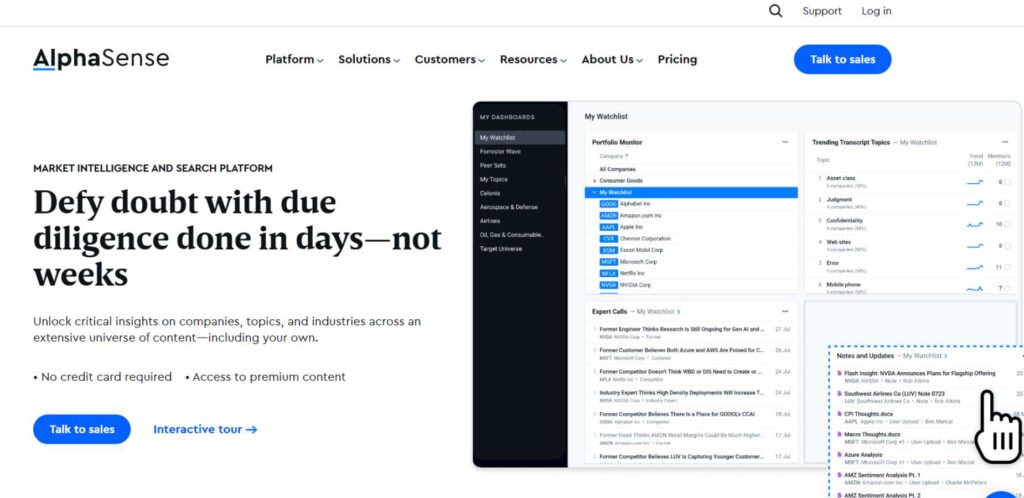
Alpha Sense is a market intelligence solution that leverages artificial intelligence to help financial analysts and professionals make sense of large sets of information. They are an NLP and machine learning-based platform to find out the trends in the market and the performance of the company from the earnings calls, SEC filings, news articles and everything else happening in real-time.
Key Features:
- Real-time search and analysis of financial documents including earnings calls and reports with AI help.
- Knowledge mining to review the state of the market and new relevant trends.
- Artificial intelligence for estimating the markets.
- Linking with third-party financial information feeds.
Positives:
- Real-time evaluation of company and market patterns using AI.
- Alert services regarding any financial news and events.
- Reduces time when human beings have to analyze documents by automating the entire process.
Negatives:
- There is a high cost for small firms or individuals to obtain the services.
- May take low-level users some time to fully exploit its potential through the features that it offers.
Pricing: Pricing is customized, typically starting at around $500 per month depending on the features and scale.
Best For: Financial analysts, portfolio managers, and researchers needing AI-powered market intelligence.
Ratings: 4.8/5
Website: www.alpha-sense.com
5. Dataminr
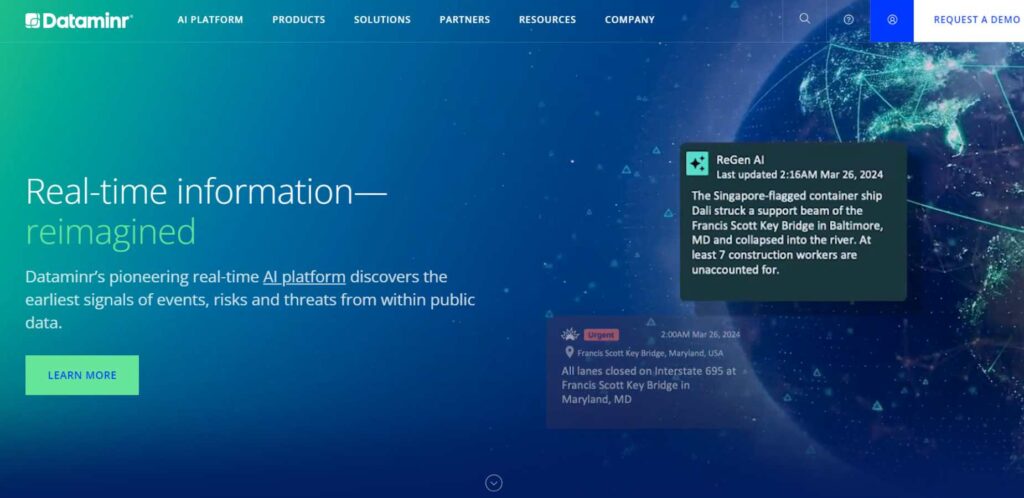
Dataminr delivers real-time alerts that are based on the artificial intelligence of market moving events. It analyzes public data such as social media and news feeds to alert financial practitioners of new events constituting news that may have an impact on the market or other relevant news. Dataminr is being applied by hedge funds as well as traders and corporate security teams to make a move on timely information.
Key Features:
- Actual time alerts of market-changing events utilizing artificial intelligence and data management.
- Notifications in social networks, in the news, and in public information.
- Options for selecting varied alert options by individual market events.
- Compatibility with other large-scale financial data networks.
Positives:
- Is capable of feeding its users with the happenings of the market that can have an impact on the market.
- It assists various subdivisions in finances to remain informed with new knowledge and information.
- Appropriate for a range of industries from financial to security-related services.
Negatives:
- May greatly overload users with notifications if the notification’s repetition is not well done.
- Lack of affordability angle for industries or organizations that have huge data requirement
Pricing: Custom pricing based on the specific needs of the client.
Best For: Financial professionals needing to stay updated on real-time market-moving events.
Ratings: 4.5/5
Website: www.dataminr.com
6. OpenAI’s GPT for Finance

The GPT models by OpenAI offered automation in the completion of financial documentation, client communication and decision-making. In addition to exploiting NLP to sift through large sets of data and summarize it, these AI tools create insights, reports, and responses that optimize financial advisory and administrative work.
Key Features:
- Automated production of financial reports and documentation using the NLP technique.
- AI-activated client engagement and chatting capabilities.
- Flexible for use in any kind of advisory or analysis of the various aspects of financial requirements.
- Transactional and can be applied at any level in the firm.
Positives:
- Very flexible, which allows it to be used in various financial processes, in large organizations as well.
- Reduces time spent in generating reports, and communicating with its clients.
- AI model which adapts with time and gets better with updates.
Negatives:
- Best implemented if technical skills are fully leveraged in the process.
- The price can increase with shared usage, especially for extending it to many clients where it will be required heavily.
Pricing: Based on API usage, with pricing starting at $0.03 per 1,000 tokens.
Best For: Financial advisors, analysts, and firms looking for automation in financial documentation and client interactions.
Ratings: 4.7/5
Website: www.openai.com
7. Trade Ideas

Trade Ideas is an AI-based platform offering trade suggestions, back-testing and auto trading. According to what it does, it applies machine learning algorithms to analyze approximating stock exchange movement and giving traders real-time trading opportunities in the stock marketplace and also assists in optimizing traders’ portfolios and trade management.
Key Features:
- Expert trade idea generation and recommendations anchored on artificial intelligence.
- A trading simulation that allows backtesting of strategies aiming at stock trading.
- Selected examples include real-time alerts on stock prices and market forecasts.
- Brokerage API’s automation for automated trading.
Positives:
- It offers specific trade ideas and then adds on-the-fly analysis.
- Aids in trading that reduces the amount of control given to robots and automated systems.
- Ideal for beginners as well as the professionals in trade market.
Negatives:
- High subscription cost than other trading tools.
- May be too complicated for those who are new to trading and do not have any experience in trading.
Pricing: Pricing starts at $228 per month for a standard plan.
Best For: Active traders and investors looking for AI-driven trade recommendations and backtesting tools.
Ratings: 4.6/5
Website: www.trade-ideas.com
8. Alpha Vantage
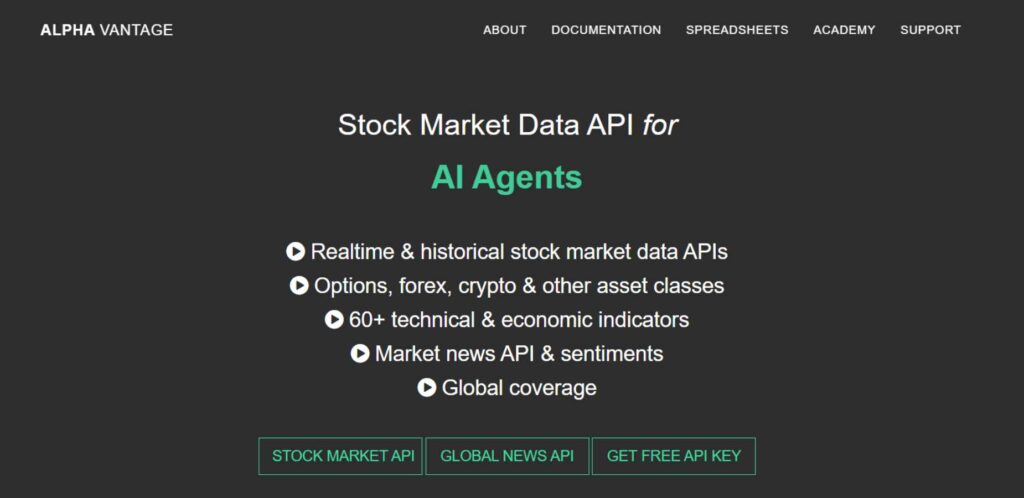
Alpha Vantage has a variety of market data APIs covering the stock market, forex, and cryptocurrency trading. It provides a free basic version that allows users access to real-time and prior information on various markets and a paid advanced version that avails technical analysis tools that employ AI and machine learning for modelling.
Key Features:
- Market data real-time and historical data feeds access.
- Analyzing data depending on the technical performance of devices and probabilistic prognosis of financial streams.
- The first tier is of free version with access to some limited features.
- Appropriate for various kinds of underlying assets and various tactics utilized for buying and selling these assets.
Positives:
- For many markets and several types of assets (shares, foreign exchanges, cryptocurrencies).
- An uninterrupted flow of any relevant data is significant to the developers regarding the free market.
- You have AI-based tools for predictive analytics.
Negatives:
- Premium pricing may be expensive for those customers who need a lot of data usage.
- Few resources and few tutorials for newcomers.
Pricing: Free basic access with premium plans starting at $29.99/month for more features and higher data volume.
Best For: Traders, developers, and financial analysts seeking a robust platform for market data, technical analysis, and machine learning tools.
Ratings: 4.6/5
Website: www.alphavantage.co
9. Kensho
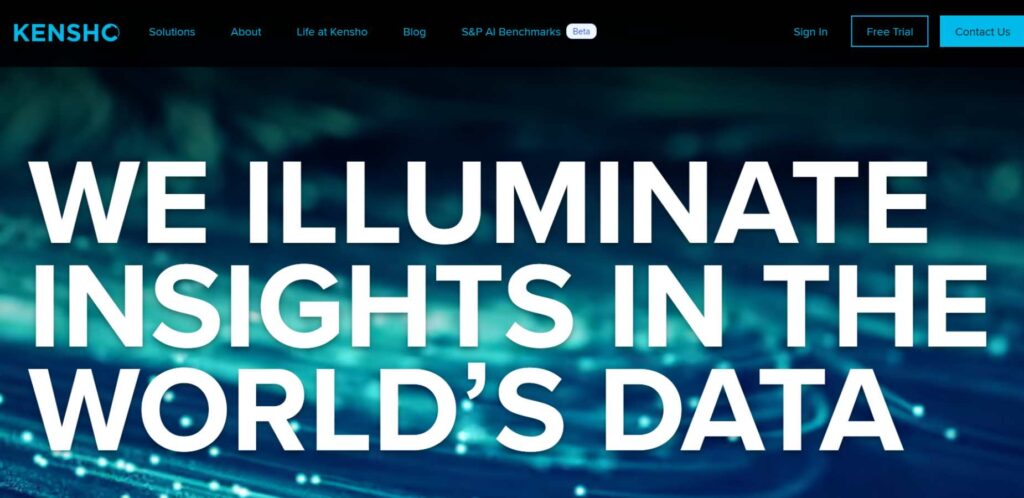
Kensho is an independent financial analytics platform that delivers advanced systems to analyze global financial data. It is intended for use by major investment houses, hedge funds, and banks/financial institutions that need sophisticated modelling tools for managing risks, strategy formulation, and forecasting.
Key Features:
- Machine learning and data-based financial modelling and prediction.
- Live and instant information on markets and events.
- Risk management instruments for big participants.
- A large amount of information was provided on equities and commodities and macroeconomic data.
Positives:
- Sophisticated financial traffic and prediction options.
- Working with current data in a decision-making process.
- Enterprise system integration and high system availability.
Negatives:
- Due to high cost, it may not be very functional to a larger institution.
- It may be limited by the complexity of use; for one to operate it to the full, one may need training.
Pricing: Custom pricing based on the scale of use and client requirements.
Best For: Financial institutions, hedge funds, and large-scale investors requiring deep financial analytics.
Ratings: 4.7/5
Website: www.kensho.com
10. Vise
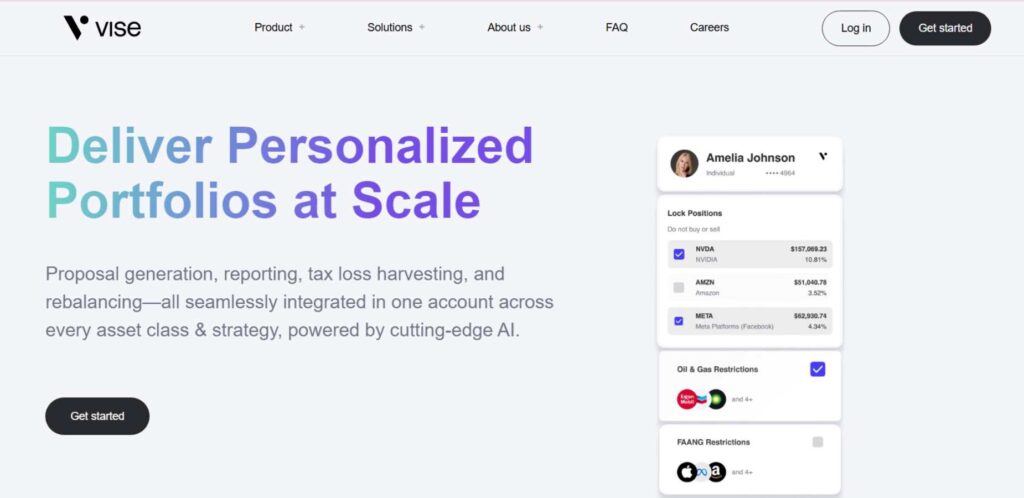
Vise is an artificial intelligence-based financial advisory application that financial advisors use to manage portfolios. Thus, through the application of artificial neural networks, Vise is able to minimize or dispense with portfolio optimization and rebalancing, all of which is done according to the client’s financial objectives, risk preferences and market conditions.
Key Features:
- Portfolio construction and adaptation through the help of artificial intelligence.
- Automated portfolio rebalancing.
- Personalized portfolios about the clients.
- Banking with the custodians and financial institutions.
Positives:
- Provides individual profiles for their clients, therefore creating individual investment plans.
- Helps to optimize portfolio ownership processes for wealth managers.
- Applicable for firms of different sizes.
Negatives:
- Poor funding to slightly developed and more exotic forms of investment.
- May demand pre-existing or an acceptable level of technical know-how.
Pricing: Custom pricing based on the firm’s needs and scale of operations.
Best For: Wealth management firms and financial advisors looking for AI-powered portfolio management.
Ratings: 4.6/5
Website: www.vise.com
11. Alteryx

Alteryx is a cloud-based software that provides artificial intelligence solutions for preparing data, combining it across multiple applications and using analytics for drawing accurate conclusions that can enable effective decision-making among financial personnel. It is also especially popular for enabling people with no programming experience to work with and analyze big data.
Key Features:
- Reusable drag-and-drop blocks for creating workflows
- Machine learning-based data preparation and integration
- Mainly statistical analysis, big data and data mining techniques
- Compatibility with other trade and financial application programs
- Data application that solves the problem of working with both small and large sets
Positives:
- Ease of use can be used by common people
- It helps to automate difficult actions on data
- Intergraded with other data and financial instruments
- A good level of analytics and forecasting
Negatives:
- Pricing may be on the higher side to accommodate smaller business enterprises.
- Lacks an intuitive interface for access to more specific tools or functions.
Pricing: Custom pricing based on company needs, starting at approximately $5,000 per year for enterprise access.
Best For: Financial analysts, accountants, and firms looking to automate and integrate complex data tasks for better forecasting and financial analysis.
Ratings: 4.6/5
12. Scalable Capital

Scalable Capital is an AI-based automated digital wealth management company. It integrates complex computer trading strategies with an individual’s recommendations to allocate his investments. The platform is for investors who are interested in acquiring a diversified portfolio for retail at a low expense.
Key Features:
- Implementation of artificial intelligence in the process of portfolio optimization and asset selection.
- The flexibility of tracking and changing the portfolios depending on fluctuations in the financial market.
- Custom-comer portfolios that allow clients to choose between high risk/high return and low risk/low return.
- No extra charges on top of the stated cost.
Positives:
- Affordable and automatic solutions with intelligent assistance in wealth management.
- Suitable for those who invest with much intensity for extended periods.
- All the fees should be well spelt out and easily understood by the ordinary client.
Negatives:
- Less human advisor assertion for the complicated fiscal state of affairs.
- Heavy reliance on this process may not be suitable for people with high net worth or other complicating factors to the portfolio.
Pricing: Management fee starts at 0.75% annually, with no minimum deposit required.
Best For: Retail investors seeking low-cost, AI-driven wealth management with a focus on passive investment strategies.
Ratings: 4.4/5
Website: www.scalable.capital
Key Trends in AI and Finance for 2024
The use of AI in finance continues to grow and evolve. In 2024, several key trends are shaping the future of financial services:
- Integration of AI with Blockchain: The integration of AI for financial management and blockchain is currently enhancing safe and accurate trading procedures. This integration is sending ripples in sectors like cryptocurrency trading as well as cross-border payments.
- AI in Customer Service: In the financial industry, users of AI-based financial planning tools are now using chatbots and virtual assistants for better customer service and quick responses to clients’ questions.
- Predictive Analytics: Advanced Robo-advisory algorithms are a breakthrough for financial managers as they can use the technology to predict the kind of markets, consuming habits and the overall shift in economies.
- AI-Driven Regulation and Compliance: With an increasing number of regulations that companies must adhere to, AI financial software is helping firms process audits more efficiently when new laws emerge.
- AI-Powered Robo-Advisors: The most effective AI tools for finance are changing the face of wealth management through robo-advising that gives automated value-added solutions for investment thereby making it easier for one to keep his/her portfolio.
How AI is Shaping the Future of Finance
The use of artificial intelligence is not only streamlining financial processes but from a technological standpoint, they are redefining the provision and usage of financial services. Here are a few ways AI for finance is shaping the future of the industry:
Financial Inclusion
AI is also useful today in the expansion of financial services for the less banked especially in developing economies by introducing other forms of data to approve loans and providing specified loans. This is possible with the best AI for finance management tools that enable more accurate credit risk profiling.
Real-Time Data Processing
Self-developed with AI financial software, institutions can learn, make decisions and answer the data within seconds. This is especially beneficial in dynamic markets since traders, analysts and advisors will benefit from the AI FP tools that provide quick analysis to enable quicker decision-making.
Behavioral Analytics
AI in finance can help to understand the consumer’s spending manner and his or her needs to propose optimal financial offers, including investment solutions or savings plans.
Sustainable Finance
AI is also helping the finance industry to link financial products with sustainability. ESG driven by AI can help financial institutions monitor the environmental, social, and governance scores and provide insights to help in decision-making.
Robo Advisors
Robo-advisory, which provides computerized guidance in investment are adding the facet of artificial intelligence. Automated systems help them create portfolios in a way that benefits from market movements thus offering customers inexpensive, tailor-made solutions.
Conclusion
In the future starting from the year 2024, there will be an enhancement of the use of intelligent tools in the field of finance to enhance the efficiency of the financial gurus. The most effective AI instruments used in the financial sector today are being applied to improve risk assessment, reduce the procedures involved, and improve customer services.
Utilising these AI financial management tools, professionals can certainly gain the edge as well as enhance decision-making on productivity and consecutively create better value for their clients and organisations.
Frequently Asked Questions (FAQs)
What kind of benefits do AI Tools for Finance bring to financial professionals?
The use of AI tools enables improved decision-making through the provision of real-time information, and trends, minimization of tasks that require frequent repetition, and more efficient risk mitigation.
Can advanced tools be employed by ordinary traders and institutional investors alike?
Yes, they are available to everyone from buying and selling stock to investing and financial planning for the private and large companies.
How do AI Tools for Finance improve risk management in the field of finance?
AI provides clues as to which risks may occur and what could happen in the market; it reveals patterns of fraud, enabling financial specialists to make informed decisions.
What is the specific application of machine learning in applying AI to the financial sector?
Machine learning helps AI applications enhance their performance by learning from the data set and improving prediction or decision-making as and when used.

